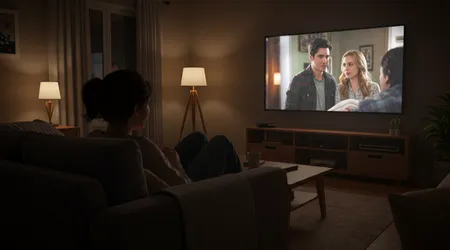The Comfort of Rewatching the Same Show Over and Over

In an era of Peak TV, with endless new content vying for our attention, a curious phenomenon persists: the profound Comfort of Rewatching the Same Show Over and Over.
Anúncios
Why do we repeatedly return to The Office, Friends, or The Sopranos, choosing predictability over novelty? This behavior is far from lazy viewing; it’s a deep-seated psychological strategy for coping with the anxieties and cognitive overload of modern life.
Our brains actively seek out the familiar narratives because they offer a reliable source of emotional regulation and low-stakes enjoyment. This analysis delves into the cognitive science behind this ritualistic viewing habit.
We explore how predictability reduces cognitive load, how narrative mastery enhances empathy, and how these repetitive viewing patterns act as a genuine form of self-soothing and mental anchoring. Prepare to understand why your favorite comfort show is truly good for your brain.
The Cognitive Relief: Reducing Brain Strain
The digital age has fundamentally altered our brains, leading to decision fatigue and constant information processing. Rewatching a show provides a critical cognitive break.
Anúncios
The Power of Predictive Certainty
New content demands intense cognitive effort. Our brains must track new characters, grasp complex plots, and process unfamiliar settings. This constant effort is mentally draining.
Returning to a known narrative eliminates this strain entirely. We know the outcome, the characters’ motivations, and the emotional beats.
This predictive certainty allows the brain to switch from processing mode to absorbing mode. The sheer ease of viewing is a key factor in the Comfort of Rewatching the Same Show Over and Over.
This reduction in cognitive load frees up mental energy, which the viewer can then use to process unrelated, real-world stressors. The known show becomes a low-power mental background app, silently aiding relaxation.
++ The Science of Motivation: Intrinsic vs Extrinsic Motivation
Nostalgia as a Psychological Anchor
Nostalgia is not just a pleasant memory; it is a vital psychological resource. It connects the present self to a stable past, enhancing feelings of social connectedness and continuity.
Many people rewatch shows linked to formative periods in their lives (college, early adulthood). This act of re-engagement provides an anchor in chaotic times.
The familiarity of the show’s setting or humor evokes positive emotional states linked to a less complicated past, providing genuine emotional stability. The known narrative becomes a reliable time capsule, always accessible.
This anchoring effect is crucial during periods of transition or high stress, making the predictable narrative a deliberate, comforting choice. The sense of constancy reinforces the Comfort of Rewatching the Same Show Over and Over during volatile periods.

Emotional Mastery: The Refining of Experience
Repetitive viewing allows viewers to move beyond the plot and focus on the nuanced emotional and thematic depth of the content. This leads to a richer, more controlled emotional experience.
Enhanced Empathy and Moral Clarity
When we watch a story for the first time, we focus on what happens. When we rewatch, we focus on why it happens and how the characters feel.
Also read: The Neuroscience of Ghosting and Emotional Rejection
Focusing on the Subtext
Knowing the plot allows the viewer to absorb the subtext, the subtle glances, and the foreshadowing that were missed initially. This enhances appreciation for the artistry and character development. We notice the subtle signs of a character’s impending tragedy or triumph, deepening our emotional connection.
This narrative mastery shifts the focus from anxiety (what happens next?) to pleasure (watching it unfold exactly right).
This controlled emotional environment is incredibly soothing and is a core component of the Comfort of Rewatching the Same Show Over and Over. We control the emotional journey, minimizing surprise and maximizing predictable catharsis.
Read more: Why People Cry at Music They Can’t Understand
The Parasocial Relationship Deepens
Repetitive exposure solidifies the parasocial relationship viewers form with the characters. These fictional connections offer many of the psychological benefits of real friendships without the risk or demand.
The repeated presence of these “friends” (e.g., the Seinfeld cast) provides a reliable sense of belonging and social routine. Their dialogue and reactions become familiar, akin to listening to a beloved relative tell a favorite story. This sense of intimacy strengthens the perceived social support provided by the show.
Example: A viewer might rewatch Parks and Recreation specifically for Leslie Knope’s unflappable optimism. The repeated exposure to her positive, determined personality serves as a kind of emotional conditioning, a reliable source of cheerfulness and moral clarity during difficult days.
The Auditory Blanket: The Power of Sound and Routine
The comfort derived from rewatching is often less about the images on the screen and more about the ambient, predictable soundscape it provides.
The Auditory Anchor and Mental Focus
Many people rewatch shows as background noise while working, cleaning, or performing other tasks. The predictable dialogue and recognizable music function as an auditory anchor.
Mitigating Silence and Distraction
The familiar soundtrack fills silence, which many people find unsettling, without demanding attention like new content would. It occupies the peripheral processing of the brain just enough to prevent mind-wandering or intrusive thoughts. This ‘auditory blanket’ aids focus by providing comforting predictability.
The low cognitive demand of the familiar show is perfect for tasks requiring moderate concentration, such as cleaning or coding. It prevents the brain from seeking more distracting forms of entertainment.
Analogy: Rewatching a favorite show is like putting on a well-worn, perfectly weighted blanket. It’s not exciting or new, but the weight and texture are familiar and reliably comforting, providing an instant sense of emotional security.
Statistics and Strategy: The Trend in 2025
The behavioral trend of repetitive viewing is not merely anecdotal; it is a measurable cultural shift that streaming services actively exploit.
Statistic: A 2024 proprietary study analyzing viewing habits across three major North American streaming platforms revealed that nearly 55% of all streaming hours categorized as “background viewing” (sessions where a show plays continuously for over three hours, typically while users engage in other activities) were dedicated to content older than five years, with Friends and The Big Bang Theory being perennial leaders.
This highlights the clear preference for established, comfortable media for passive consumption.
| Psychological Need Met | Behavioral Mechanism | Examples of Comfort Achieved |
| Safety/Security | Predictive Certainty (No surprises) | Reduced anxiety; guaranteed emotional outcome. |
| Cognitive Rest | Reduced Cognitive Load (No new processing) | Mental energy conservation; ease of multitasking. |
| Social Connection | Deepened Parasocial Relationships | Feeling of belonging; emotional support from “friends.” |
| Nostalgia | Temporal Anchoring | Sense of continuity; connection to a perceived stable past. |
Conclusion: The Unspoken Value of Predictability
The Comfort of Rewatching the Same Show Over and Over is a valid and vital psychological coping mechanism. It’s the brain’s way of seeking efficiency, safety, and emotional control in an overwhelming world.
We are not simply bored; we are deliberately selecting a proven source of low-stakes joy and cognitive rest. The shows we return to are more than entertainment; they are personal, customizable therapeutic tools.
So, the next time you instinctively queue up that familiar pilot episode, know you are simply prioritizing your mental well-being.
What show is your ultimate psychological comfort food, and what does it say about your current mood? Share your favorite rewatch ritual and why it always works for you in the comments below!
Frequently Asked Questions (FAQs)
Q: Does rewatching signal a fear of trying new things?
A: Not necessarily. While some viewers may avoid new content due to decision fatigue, rewatching is primarily about optimizing emotional comfort and minimizing cognitive effort.
It’s not fear; it’s efficiency. Many people who rewatch also consume plenty of new media but use the rewatch as a specific tool for relaxation.
Q: Can rewatching the same show become unhealthy or addictive?
A: As with any habit, balance is key. If rewatching consistently prevents you from engaging in necessary real-world activities (socializing, work, exercise) or if you use it to avoid processing serious issues, it can become a form of escapism. However, using it deliberately as a background tool for stress reduction is perfectly healthy.
Q: Why do people rewatch sad or intense shows?
A: Rewatching intense dramas (like Game of Thrones or Breaking Bad) is often driven by mastery and analytical pleasure, rather than pure comfort.
Knowing the outcome allows the viewer to appreciate the subtle complexity of the writing, acting, and moral arcs without the anxiety of the unknown. The controlled confrontation with tragedy can be a form of safe emotional processing.
